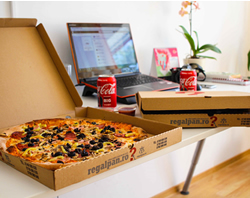Amanda Mull* says many workplace are plagued by petty sniping about diet and exercise routines.
 The first time someone commented on what I was eating at work, I was a teenager at my first job.
The first time someone commented on what I was eating at work, I was a teenager at my first job.
On the way out one day, a regular visitor interrupted my fistful of cashews to tell me he loved watching me eat — I did it with such relish.
Before I could think of a response, he left.
At 18, I was already well aware of the frequency with which grown men say bizarre things to teenage girls, but what stuck with me was the fact that someone who wasn’t a parent or close friend noticed when and what I ate.
It was like realising I had been looking into a two-way mirror all along, and the food police were on the other side.
This incident was a startling introduction to an experience that I eventually learned is common in workplaces: being compelled to talk about my body through pointed comments or idle diet chat among co-workers.
At another job, co-workers asked why I subjected myself to 280-calorie frozen diet meals, and then raised their eyebrows when people ate “too much” fast food.
At my first job after graduation, I shared an office with a guy who always expressed his surprise if I bought lunch several days in a row instead of bringing it myself.
My experiences aren’t just a string of bad luck with break-room busybodies.
The workplace remains a stubborn locus of petty sniping about diet and exercise routines.
Many workers have a hard time escaping that one person leaning over people’s shoulders to give them feedback on their lunches.
Office diet scolds are more than annoying: In a culture where disordered eating is often rewarded and larger people, especially larger women, get passed over for promotions, workplaces that let food-shamers run rampant can threaten their employees’ careers — and their health.
Twitter’s CEO, Jack Dorsey, who has talked publicly of fasting for days at a time to achieve focus and productivity, might be one of the most prominent passive-aggressive workplace-wellness practitioners.
At a time when workplace propriety is as touchy an issue as it has ever been, it might seem counterintuitive that a person’s body size and food choices would be such routine fodder for conversation.
In reality, the fact that many personal things are strictly off-limits might make dieting an even more tempting topic.
Anat Lechner, an organisational-management professor at NYU’s Stern School of Business, says that’s because work is a fundamentally social setting.
“To feel real in a workplace and not just like a cog in a wheel, we have a need to connect when we can,” Lechner explains.
“We may not choose to talk about going through divorce or some big disease we have, so we revert to things that are real, but a little less intimate.”
That’s where food, exercise, and bodies come in.
Even though weight can be a touchy subject, the ideas that weight loss is always positive and that being thin is a reliable indicator of overall health can make weight feel like an appropriate topic for workplace bonding.
After all, size is public and observable.
Even if your co-workers aren’t picking on others, they might be using their own bodies as frequent conversation starters.
That tends to conscript people into the cycle of diet chat without the red flag of bullying.
“This idea that weight loss is universally lauded and praised really hurts people struggling,” says Claire Mysko, the CEO of the US National Eating Disorders Association (NEDA).
Mysko notes many people in recovery from restrictive disorders such as anorexia report that their weight loss was widely encouraged at first, which reinforces life-threatening behaviours and often delays treatment until the disorder is worse.
Lechner and Mysko both point to a relatively recent workplace trend that reinforces these norms, even as diet chat becomes more passé among the socially aware: workplace-wellness programs.
These weight-loss and exercise challenges have become a typical part of office life in the past decade, pressuring employees to restrict their eating and sometimes overexercise, often to win cash prizes for themselves or their team.
“There’s a huge amount of money being invested in a program that essentially makes it okay for people to shame others,” Mysko says.
“There’s an idea that if people feel shamed, they’re going to ‘take better care of themselves,’ and all of these very shaming kinds of messages are validated by these programs.”
In reality, the opposite is true: Research has consistently shown that shaming fat people harms both their physical and their psychological wellbeing.
Part of the blame also goes to the idea of “wellness”.
The wellness trend, as shaped by Instagram influencers and nutrition and supplement start-ups, recasts thinness as not a goal in and of itself, but as the primary indicator of corporeal sophistication and spiritual peace.
That helps the diet industry evade the hard-fought battles that activists have won to diminish some of dieting’s more extreme components, such as liquid meal replacements, and sell basically the same stuff they’ve always offered.
It also makes old opportunities for idle chatter and passive aggression feel novel and righteous.
“Wellness in general is a relatively new phenomenon, so I don’t think there’s deep awareness of how we behave around this issue,” Lechner explains.
That can attract the attention of workers who are looking for a way to act out, by either putting themselves down or shaming their colleagues — or often both.
“You’re likely to find within the same person the same violation of quite a few different boundaries,” Lechner says.
In workplaces where people have been unable to negotiate healthy boundaries for themselves, it’s up to employers to find a way to deal with the instigators.
“The stuff they need to manage is just escaping through another door,” Lechner says.
“This time, it’s through wellness.”
* Amanda Mull is a staff writer at The Atlantic. She tweets at @amandamull.
This article first appeared at www.theatlantic.com.







